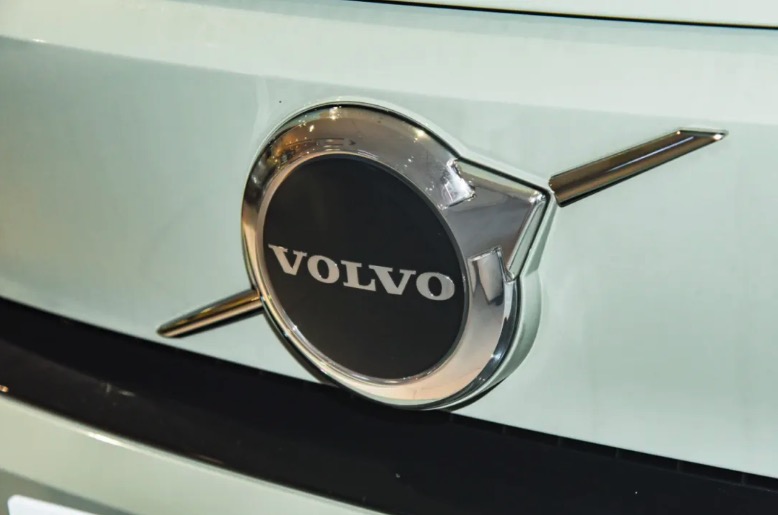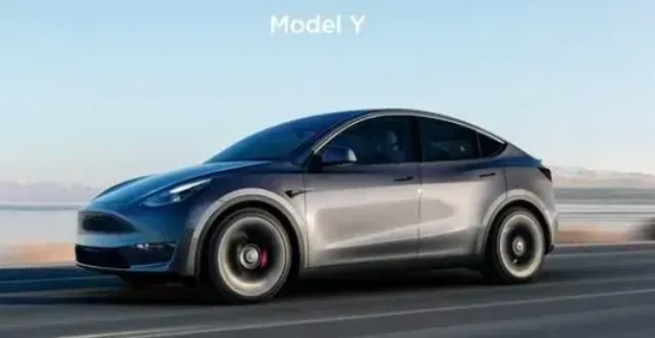On July 22nd, XPeng Motors released an announcement in the Hong Kong Stock Exchange stating that the company signed a joint development agreement for strategic cooperation in electrical and electronic architecture technology with the Volkswagen Group.
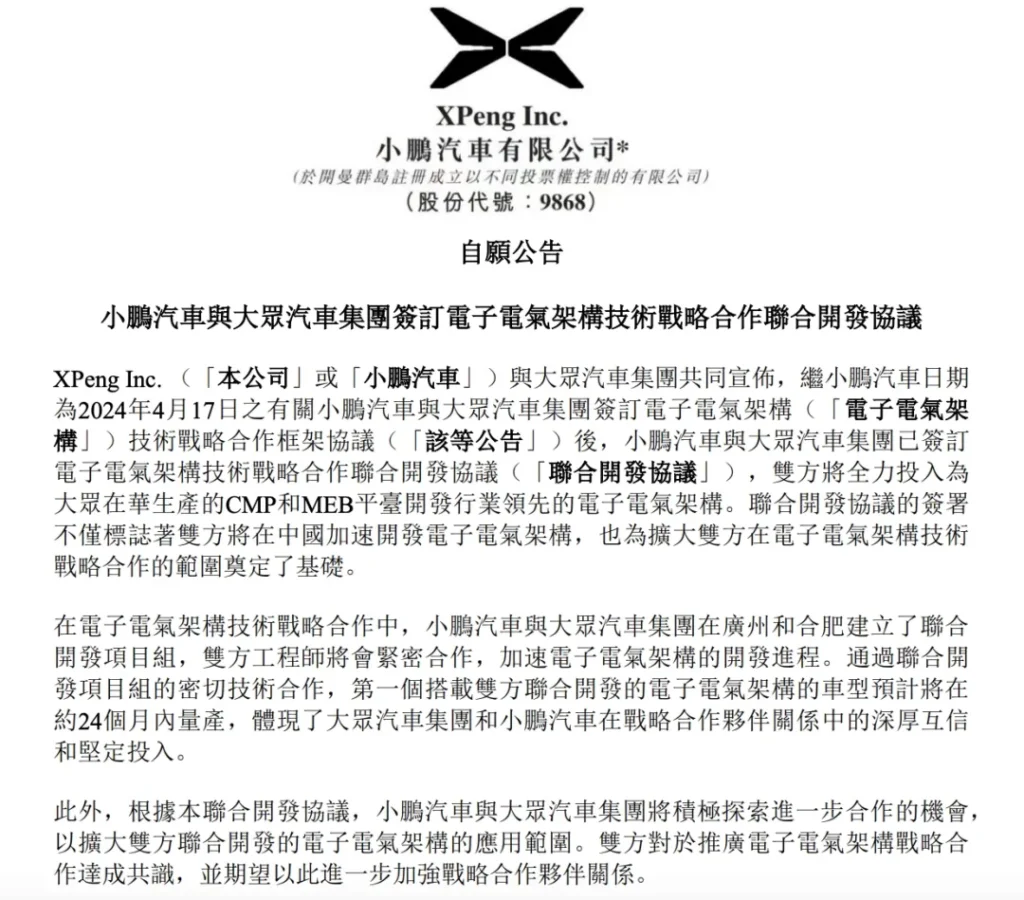
According to the joint development agreement, XPeng Motors and the Volkswagen Group will actively explore further cooperation opportunities to expand the application scope of the jointly developed electrical and electronic architecture. Both sides have reached a consensus on promoting the strategic cooperation of electrical and electronic architecture and expect to further strengthen the strategic partnership thereby. It is understood that XPeng Motors and the Volkswagen Group have established a joint development project team in Guangzhou and Hefei, and the first model equipped with the jointly developed electrical and electronic architecture is expected to be mass-produced within about 24 months.
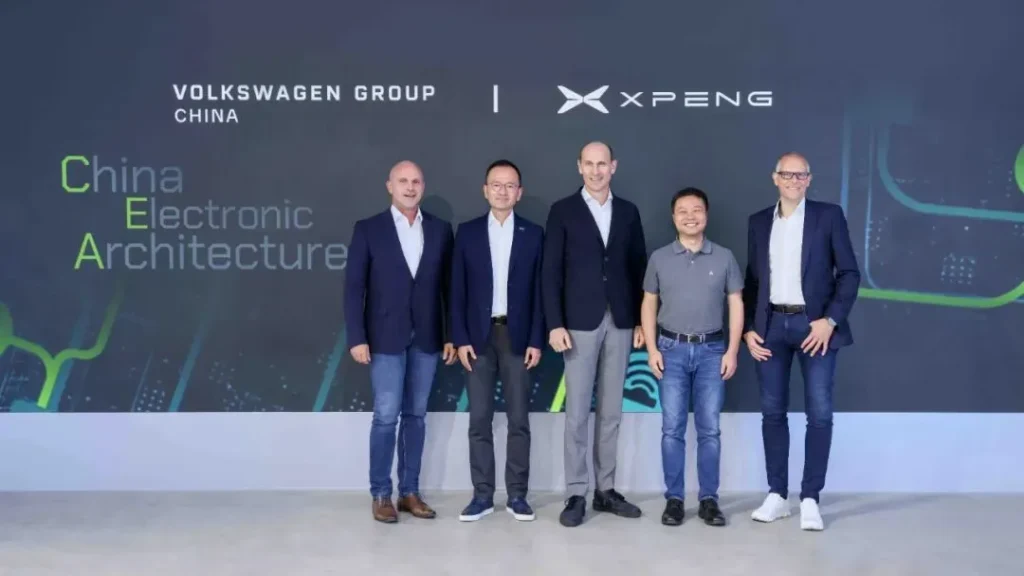
The cooperation between Volkswagen and XPeng Motors started a year ago. In July 2023, Volkswagen announced plans to invest 700 million US dollars in XPeng Motors. The two sides will jointly develop two B-class pure electric vehicle models based on their respective core competences and XPeng Motors’ G9 model platform, intelligent cockpit and high-level assisted driving system software, and will be sold in the Chinese market under the Volkswagen brand. The plan is to be launched to the market in 2026. In December 2023, Volkswagen China took a stake in XPeng Motors. After the completion of the transaction, Volkswagen China held about 4.99% of XPeng Motors’ equity and became the third largest shareholder of XPeng Motors. Volkswagen only obtained a board observer seat in XPeng Motors and had no voting decision-making power.
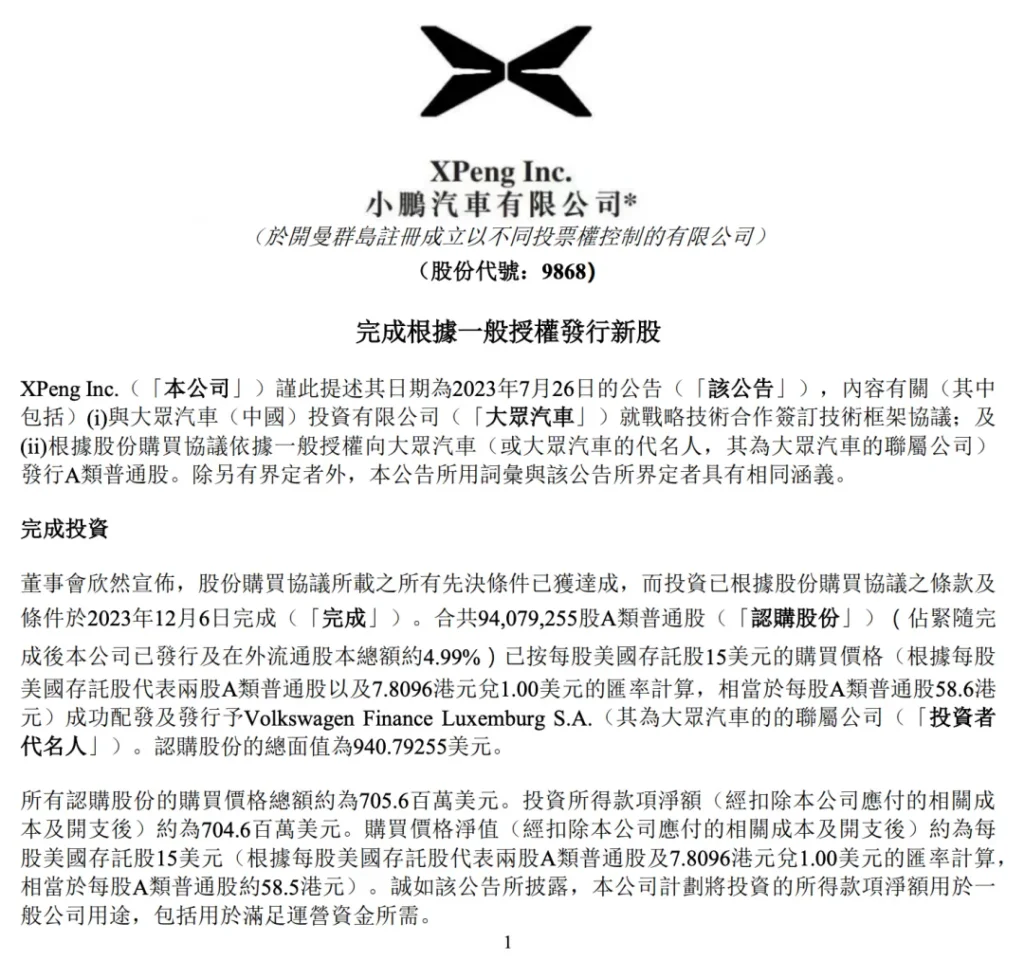
Since then, the cooperation between the two sides has been further deepened. In February 2024, XPeng Motors and Volkswagen signed a joint development agreement around the platform and software strategic technology and established a joint procurement plan for common parts of models and platforms. In April 2024, XPeng Motors and Volkswagen released a joint statement that the two sides would sign the latest strategic cooperation framework agreement on electrical and electronic architecture technology, and jointly develop a new electrical and electronic architecture platform based on XPeng Motors’ latest-generation EEA architecture, which is expected to be applied to the electric vehicle models of the Volkswagen brand produced in China from 2026.
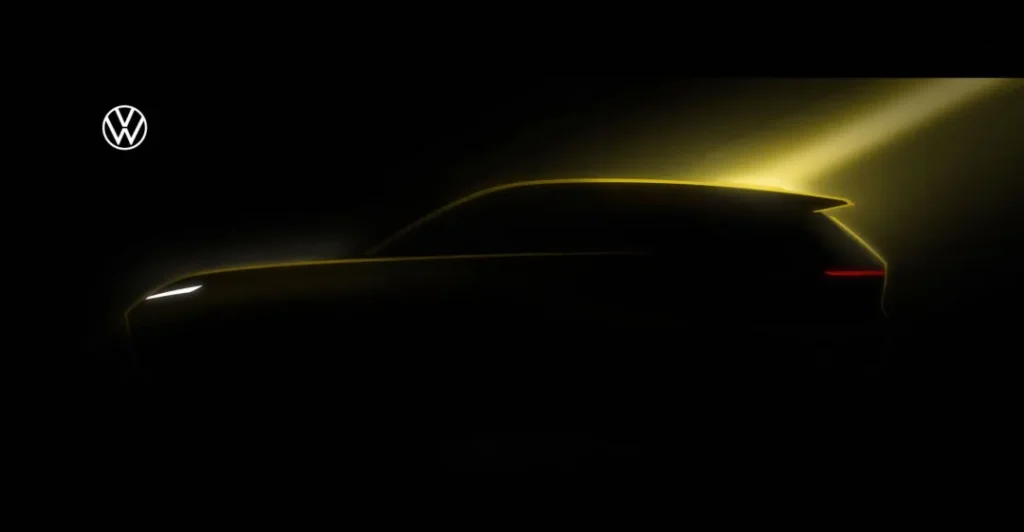
Not long ago, hundreds of Volkswagen engineers have already settled in the headquarters of XPeng Motors to strengthen the cooperation and promote the landing of the cooperation project as soon as possible. Regarding this cooperation, Bernd Leissner, Chairman and CEO of the Volkswagen Group (China), said: “From 2026 onwards, all pure electric models launched by the Volkswagen brand in the Chinese market will be equipped with this powerful and efficient electrical and electronic architecture.”
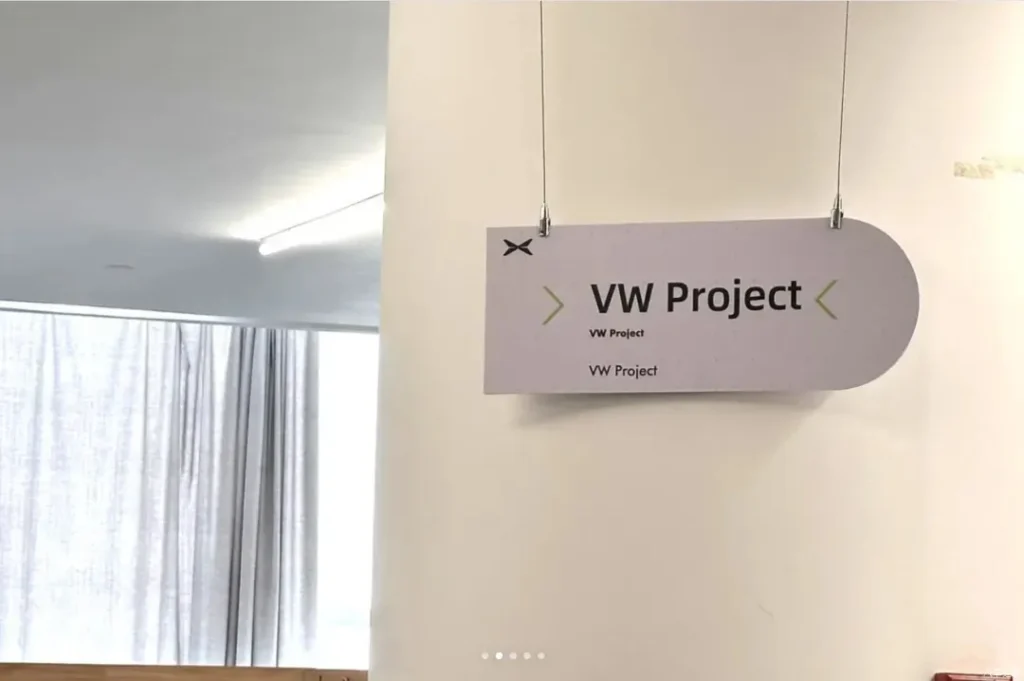
The deepening of the cooperation between XPeng Motors and Volkswagen, on the one hand, may help Volkswagen enhance its influence in the new energy vehicle market and then open the market to save the declining trend; on the other hand, it also helps XPeng Motors stabilize its position in the leading camp of new car-building forces to a certain extent and helps achieve the goal of doubling its performance in 2024.
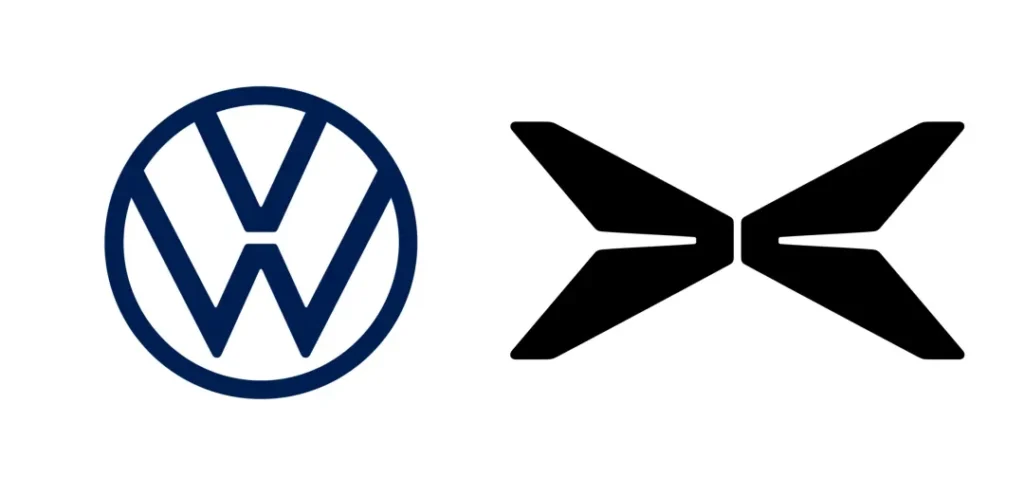
However, with the intensification of competition in the new energy vehicle market, it remains to be seen whether the cooperation between the two companies can create the effect of “1 + 1 > 2” as expected. For Volkswagen, the technical strength in the field of fuel vehicles is very strong, but in the field of electric vehicles, the technical research and development and innovation capabilities are relatively weak. This leads to that its products cannot compete with other brands in terms of performance, cruising range, intelligence, etc., especially in terms of intelligence.
In the past period of time, the electric vehicles of Volkswagen have not performed ideally in the Chinese market. In the middle of 2023, the CEO of Volkswagen, Oliver Blume, said that the business of the Volkswagen Group is highly dependent on China, however, the pure electric vehicle products have no competitiveness in the Chinese market.
The data shows that in 2023, the sales volume of pure electric vehicles of Volkswagen in the Chinese market was 191,800 vehicles, an increase of 23.2% year-on-year. Although it achieved growth, the proportion of new energy vehicles of Volkswagen was only 2%. The reason is that it still has not adapted to the needs of the new generation of consumers. The electric vehicles under Volkswagen have disadvantages such as single configuration compared with the domestic new car-building forces.
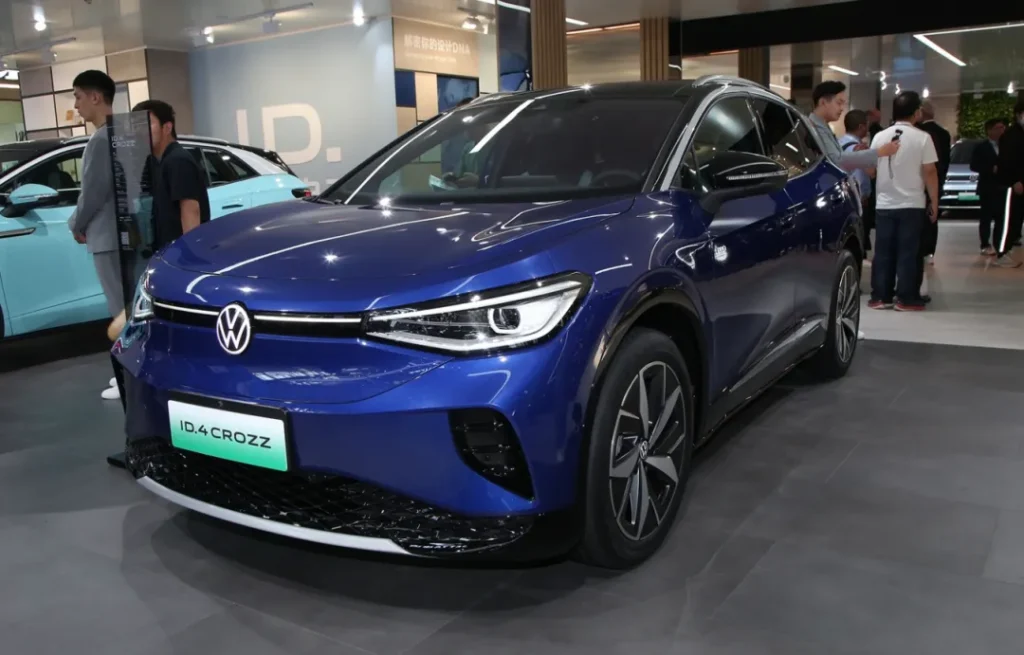
As for XPeng Motors, although it is a well-known domestic new car-building force in China, the monthly sales volume is basically stable at about 10,000 vehicles, but the overall performance is neither hot nor cold. In the first half of the year, XPeng Motors cumulatively delivered 52,028 new cars, an increase of 26% year-on-year. Among them, the highest-selling model was G6 with 15,357 vehicles, followed by X9 with 13,143 vehicles. It is understood that XPeng Motors once set an annual sales target of 280,000 vehicles. Based on this calculation, as of the end of June, the target achievement rate of XPeng Motors was only 18.6%.
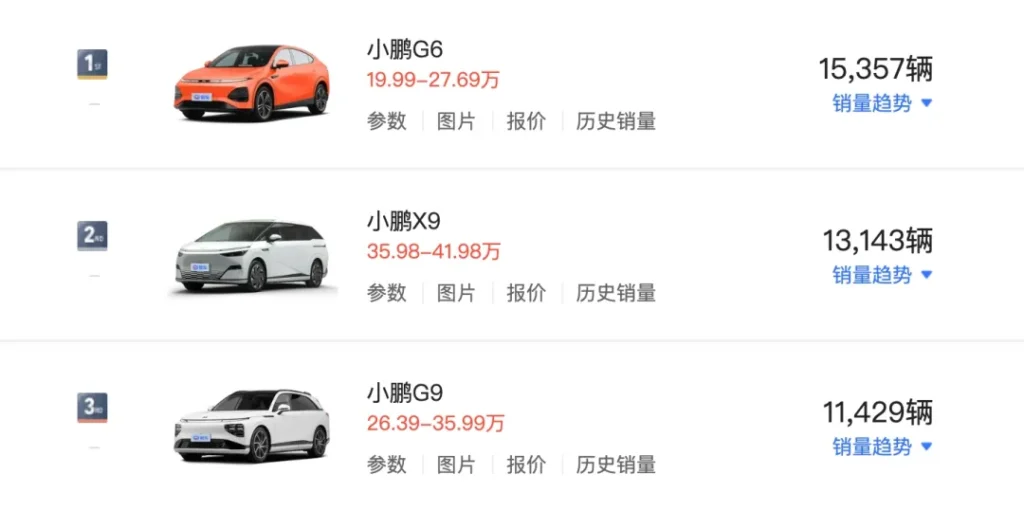
If XPeng Motors insists on the sales target of 280,000 vehicles for the whole year, the monthly average sales volume in the second half of the year needs to reach about 38,300 vehicles. In this context, He Xiaopeng, the co-founder of XPeng Motors, said that in the next three years, XPeng Motors will also launch 10 new models. Among them, a MONA pure electric sedan priced at 100,000 to 150,000 yuan will be launched in the second half of the year.
